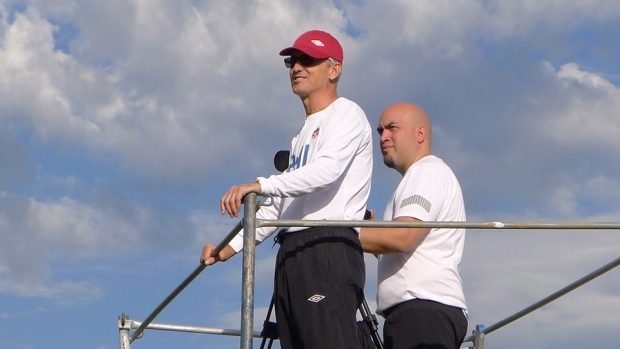Jul 7, 2015
Floro finally gets chance to lead Canada
Two years and three days after being named coach, Benito Floro finally gets to lead Canada at the Gold Cup. The 63-year-old Spaniard was named coach on July 5, 2013, but missed out on the CONCACAF championship that year because he didn't officially take over the Canadian men until Aug. 1.
The Canadian Press

TORONTO - Two years and three days after being named coach, Benito Floro finally gets to lead Canada at the Gold Cup.
The 63-year-old Spaniard was named coach on July 5, 2013, but missed out on the CONCACAF championship that year because he didn't officially take over the Canadian men until Aug. 1.
Under interim coach Colin Miller, Canada went 0-2-1 in 2013 and failed to advance past a first round that included a 1-0 loss to tiny Martinique with Floro watching from the stands.
Floro gets his first real taste of the tournament Wednesday at the StubHub Center in Carson, Calif., as Canada, ranked 109th in the world, takes on No. 89 El Salvador in Group B play.
"We believe in our players, we believe in their progress. It's time to test it," Floro said on a media conference call Monday night.
After El Salvador, Canada plays No. 65 Jamaica on Saturday in Houston and No. 14 Costa Rica next Tuesday in Toronto.
Floro inherited a team that had gone 0-6-2 while scoring just once since it was drubbed out of World Cup qualifying contention in a humiliating 8-1 loss under Stephen Hart in Honduras in October 2012.
Floro went 0-4-3 before registering his first win, a 3-1 decision over Jamaica in Toronto in September 2014.
Floro's record at the helm has since improved to 5-6-5 and Canada is currently riding a four-game winning streak — and five-match unbeaten string. But before making any 2018 World Cup travel plans, it should be noted that the average FIFA ranking for Canada's last five opponents is No. 116.
Still the Spaniard had won praise from his players for his meticulous preparation, often using video to make his point. And he has been able to attract and incorporate young talent like Cyle Larin and Tesho Akindele into the program.
Canada will mount its Gold Cup campaign without influential midfielder Atiba Hutchinson and defender Doneil Henry (both injured) and goalkeeper Milan Borjan (club commitments).
With Borjan unavailable, Floro suggested Kenny Stamatopoulos would be his likely starter in goal.
While July 25 is circled on Canada's calendar — that's when it finds out its next opponent in World Cup qualifying — the Gold Cup offers Floro a chance to test his team against CONCACAF opposition, rise in the rankings and to spend valuable time working with his players.
"It would be better for us to play not only three, (but) four or five games here," he said. "Because at the same time we (have) a good Gold Cup, we are preparing in the best conditions the team for the second World Cup (qualifying challenge)."
CONCACAF covers North and Central America and the Caribbean.
The Gold Cup, which opened Tuesday, runs through July 26 with 12 teams playing in 14 cities including Toronto. The top two teams from each of the three groups and the two best third-place finishers advance to the knockout rounds.
In his pre-tournament media talk, Floro pointed to the many challenges that face Canada.
Thanks in part to MLS rules that do not favour Canadians, only a few of his players start for Vancouver, Toronto or Montreal. Floro believes a second-tier domestic league is needed "as soon as possible" to develop home talent.
More work is needed to connect all the Canadian age-group national teams, he suggested.
Asked about whether he was happy with the support he was getting from the Canadian Soccer Association given its sizable investment in the women's game ahead of the recently concluded Women's World Cup, he said things were good.
"Things can improve," he added.
The Canadian coach said his management team is tracking some 80 to 100 Canadian players around the world but only a few, like highly touted Queens Park Rangers winger Junior Hoilett, are not part of the program. Floro said he had no news to report on Columbus Crew winger Ethan Finlay, who was born in the U.S. but is eligible to play for Canada because his father is Canadian.
The U.S. is defending Gold Cup champion and will seal a berth in the 2017 Confederations Cup if it wins the title again. If not, the 2015 winner will play the U.S. in a playoff to see who represents the region.
The Confederations Cup, which features the champions from each confederation, is held every four years in advance of the World Cup. CONCACAF made the change in determining its representative so both Gold Cup winners in a four-year cycle had a chance at making the Confederations Cup.
Canada, currently ranked 13th among CONCACAF countries, won the Gold Cup in 2000 to earn a trip to the 2001 Confederations Cup in Japan.
Follow @NeilMDavidson on Twitter
